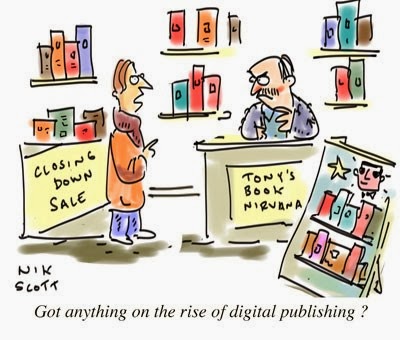There are many signs.
Independent and corporate bookstores are closing. Publishers are consolidating. Amazon is growing. ebooks and self-publishing are quickly taking over the market.
Everywhere you see the publishing industry (publishers, editors and agents) condemning the indie market, railing against the "unchecked" movement, decrying a "gateless" freedom where anyone wanting to can now publish a book. Such prattling is a sure sign of fear on their part as cash flow continues to dwindle.
The tendency certainly begs the question: "Is this good or bad?"
That depends.
On the one hand publishers have always served as "gatekeepers," regulating the quality of grammar and "worthiness" of what the public reads. In so doing they have stifled voices and thought, but kept the "standard." They have offered a sort of "badgeing" or approval service to the public. But they have also taken the lion's share of the profits and also the brunt of the risk. The bulk of authors either get rejected or, if published, see very little of the profits (royalties rarely pay more than 12%).
On the other hand, when there are no gatekeepers, anyone can have a voice. Today people are less trusting of corporate authority than in the past. They don't want authority figures telling them what they can and cannot do. They are reticent of accepting fed information. Fewer and fewer people trust the media industry and many feel it is biased. Citizen journalism, by way of the web, is on the rise as it has been since the 90s. Most people trust what their friends say before they trust the media.
This also reflects on the publishing industry. People are now saying "you can't decide for me what is worthy of reading," and they take their friend's advice over what marketing campaigns push at them. In fact, publishers are trending toward throwing their hands up when it comes to marketing--offering less and less to new authors. Often what efforts they do make do little to boost their bottom line.
You heard it said that you can lead a horse to water, but you can't make him drink. The same is true for readers: You can lead a person to a book, but you can't make them read it. No amount of marketing is going to get people to read. Word of mouth is the most effective means of advertising.
So, on the one hand you have publishers touting their "filtering" philosophy, and, on the other, you've got a public saying we don't need you.
The industry hates the indies.
At first they said it wouldn't fly and now mock it, hoping it will go away. But it won't. It grows. And most indie books aren't nearly as bad as they say they are. Some are, but many are quite good.
Authors are wising up, too. They know they don't need to face endless rejection, that they can earn more in royalties, and that they can get books to market when they want (not wait years for the corporate wheels to turn).
Furthermore, it would be wise for the publishing industry to take the initiative to reinvent themselves to embrace the movement rather than buck it. But they won't, because, even though the trend may see their demise, they are greedy. Before you know it, it will be too late.
Publishing is no longer for the elite few, but for everyone with a voice.
http://www.theguardian.com/books/2014/feb/28/waterstones-james-daunt-interview-books-bookshops-ebooks




No comments:
Post a Comment